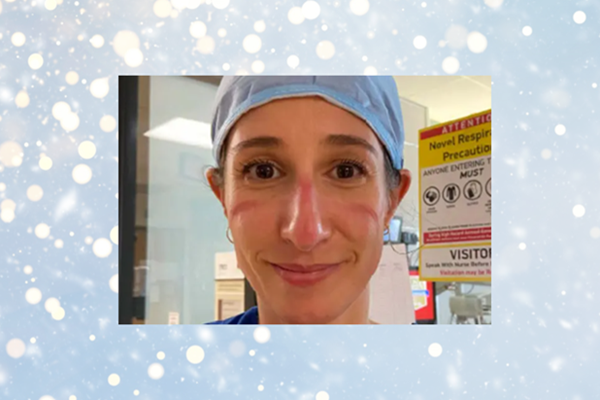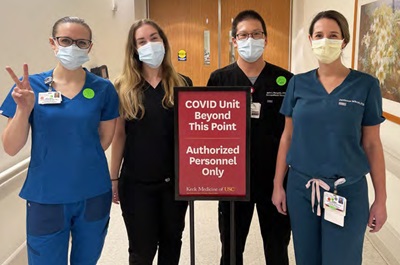
OTR with Cardiopulmonary Specialization Guides Care and Rehab Interventions for Patients With COVID-19
As the COVID-19 pandemic spread, Dr. Jamie Wilcox pioneered programs and services that focused on guiding patients through their health challenges throughout the continuum of care, from hospitalization to rehabilitation to the return home.

Jamie Wilcox, OTD, OTR/L
Associate Professor of Clinical Occupational Therapy, Chan Division of Occupational Science & Occupational Therapy/Keck Medical Center, University of Southern California
Location: California
Certified in 2013
A Professional Focus Area Becomes an Immediate Focus for the Entire Medical Community
Dr. Jamie Wilcox is an OTR and a cardiopulmonary specialist who has dedicated the past six years to the care and management of patients who are critically ill and in intensive care units at Keck Medical Center. As the COVID-19 pandemic spread, Dr. Wilcox was uniquely qualified to spearhead the development and implementation of occupational therapy interventions that treat patients with COVID-19 in multiple practice settings: critical care, acute care, acute rehabilitation, and outpatient. She pioneered programs and services that focused on guiding patients through their health challenges throughout the continuum of care, from hospitalization to rehabilitation to the return home.
In the critical stages of COVID-19, patients may be sedated, positioned in a way that limits participation, ventilated, and isolated. This confluence of factors can result in increased risk of intensive care unit-acquired weakness (ICU-AW), neurocognitive dysfunction, and delirium. Dr. Wilcox developed early engagement strategies that incorporated functional mobility, targeted therapeutic exercises, and compensatory strategies to improve patient participation in activities of daily living and to promote social interactions that target physical, cognitive, and psychosocial recovery.
Dr. Wilcox’s approach in the critical phase of COVID-19 also included strategies to mitigate risk for delirium and neurocognitive dysfunction through non-pharmacological interventions, including normalizing sleep-wake cycles, reorienting patients, and structuring the hospital environment to promote and encourage participation in daily routines.
Helping Patients Progress and Cope With Challenges
As patients progressed through acute care and rehabilitation, Dr. Wilcox provided additional clinical innovations to promote continued recovery. She developed and implemented strategies, such as an ICU diary, that helped patients fill memory gaps and connect them to their social support systems, resulting in a lower risk of depression, anxiety, and PTSD. She also created a pathway for progressive return to everyday activities that integrated mindfulness, biofeedback, and functional goal setting. This approach promoted continued engagement and mitigated the risk of further isolation and functional decline that some patients experience due to fear of symptoms such as fatigue, breathlessness, and perceived loss of control.
As patients transitioned back to the community, they could experience financial stressors, reduced quality of life, and difficulties with return to work. Dr. Wilcox’s post-COVID clinical interventions addressed physical function, lifestyle-related supports and barriers, and cognitive rehabilitation. Dr. Wilcox has been conscientious about highlighting the distinct value of occupational therapy by focusing on the use of occupation as a means and an end to recovery, as well as reintegration into work and the community.
Throughout the pandemic, health care workers became the main source of motivation, support, and encouragement for patients as they struggled in isolation. When patients needed to turn to palliative care, Dr. Wilcox made sure they were positioned safely, had access to their family and friends through technology, and had the resources to meet their spiritual needs. As an OTR, and as a human, Dr. Wilcox cared for each patient and provided the right care at the right time in the right place, whether that was rehabilitation, recovery, or palliative care.

(Photo courtesy of Carnie Lewis.)
Sharing the Innovations With the Health Care Community
Dr. Wilcox has shared her clinical innovations through multiple publications and presentations to benefit as many stakeholders as possible, and occupational therapists in similar practice settings across the U.S. have adopted her interventions. Her numerous publications and presentations clearly articulate the breadth and depth of her expertise in this important and emerging area of occupational therapy practice.
“Dr. Jamie Wilcox is a national advocate for the role of occupational therapy in acute and critical care. Not only did she develop clinical programs and services to benefit COVID-19 patients, but she widely and tirelessly shared that work with the entire OT community.”
Katie Jordan, OTD, OTR/L, FAOTA
Chief Administrative Officer, University Clinical Services